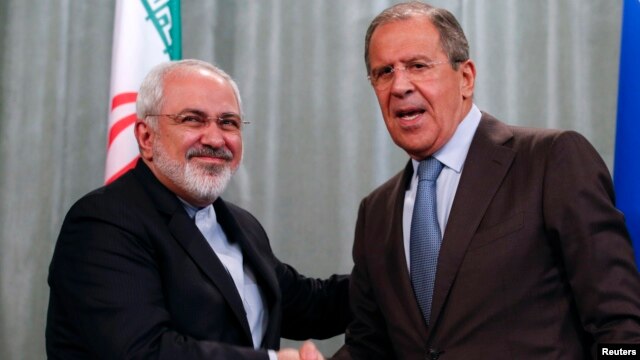U.S. imposes more sanctions against Iran
| Publisher | Radio Free Europe/Radio Liberty |
| Publication Date | 30 August 2014 |
| Cite as | Radio Free Europe/Radio Liberty, U.S. imposes more sanctions against Iran, 30 August 2014, available at: https://www.refworld.org/docid/542ac6ce15.html [accessed 31 May 2023] |
| Disclaimer | This is not a UNHCR publication. UNHCR is not responsible for, nor does it necessarily endorse, its content. Any views expressed are solely those of the author or publisher and do not necessarily reflect those of UNHCR, the United Nations or its Member States. |
Last updated (GMT/UTC): 30.08.2014 04:08
By RFE/RL
 Iranian Foreign Minister Mohammad Javad Zarif (left) met with his Russian counterpart Sergei Lavrov on August 29.
Iranian Foreign Minister Mohammad Javad Zarif (left) met with his Russian counterpart Sergei Lavrov on August 29.
The United States has announced newly imposed sanctions against more than 25 Iranian entities and individuals that Washington accuses of a range of transgressions, including expanding Iran's nuclear activities, evading sanctions, and supporting terrorism in the region.
Six Iranian banks, airlines, and a research institute are among the sanctioned entities.
The U.S. Treasury Department said Meraj Airlines and Caspian Airlines had provided illicit materials – including weapons – from Iran to Syria.
Faylaca Petroleum was accused of making payments on behalf of the Iranian government's National Iranian Oil Company.
Despite the new measures, the spokesman for the U.S. National Security Council, Caitlin Hayden, said the United States remains committed to working with its P5+1 partners toward a long-term, comprehensive solution that guarantees that Iran's nuclear program is peaceful.
Hayden said in a statement that Washington's actions on August 29 "and since the start of the talks are consistent with our commitments under the Joint Plan of Action, which provided limited relief of certain sanctions in exchange for Iranians steps that halted its nuclear program and rolled it back in key respects."
Iran and six world powers in the so-called P5+1 group – consisting of United States,Russia, China, United Kingdom, and France, and Germany – are seeking a permanent nuclear deal under which Tehran would scale back its nuclear program in exchange for a lifting of economic sanctions against Iran.
Western states fear Iran's nuclear program is aimed at secretly creating a nuclear weapons capability.
Earlier on August 29, Iranian Foreign Minister Mohammad Javad Zarif said Tehran hoped to reach a "positive result" in its talks with the P5+1 ahead of a November deadline, thanks in part to support from Russia.
Speaking at a joint news conference with his Russian counterpart Sergei Lavrov after talks in Moscow, Zarif also said sanctions will not be an obstacle to the development of Iran's nuclear program.
Lavrov said Moscow supports a solution "based on the respect for Iran's right to peaceful uses of nuclear energy," including the right to enrich uranium.
Tehran has criticized sanctions in the past as being counterproductive.
With reporting by Reuters and ITAR-TASS
Link to original story on RFE/RL website
